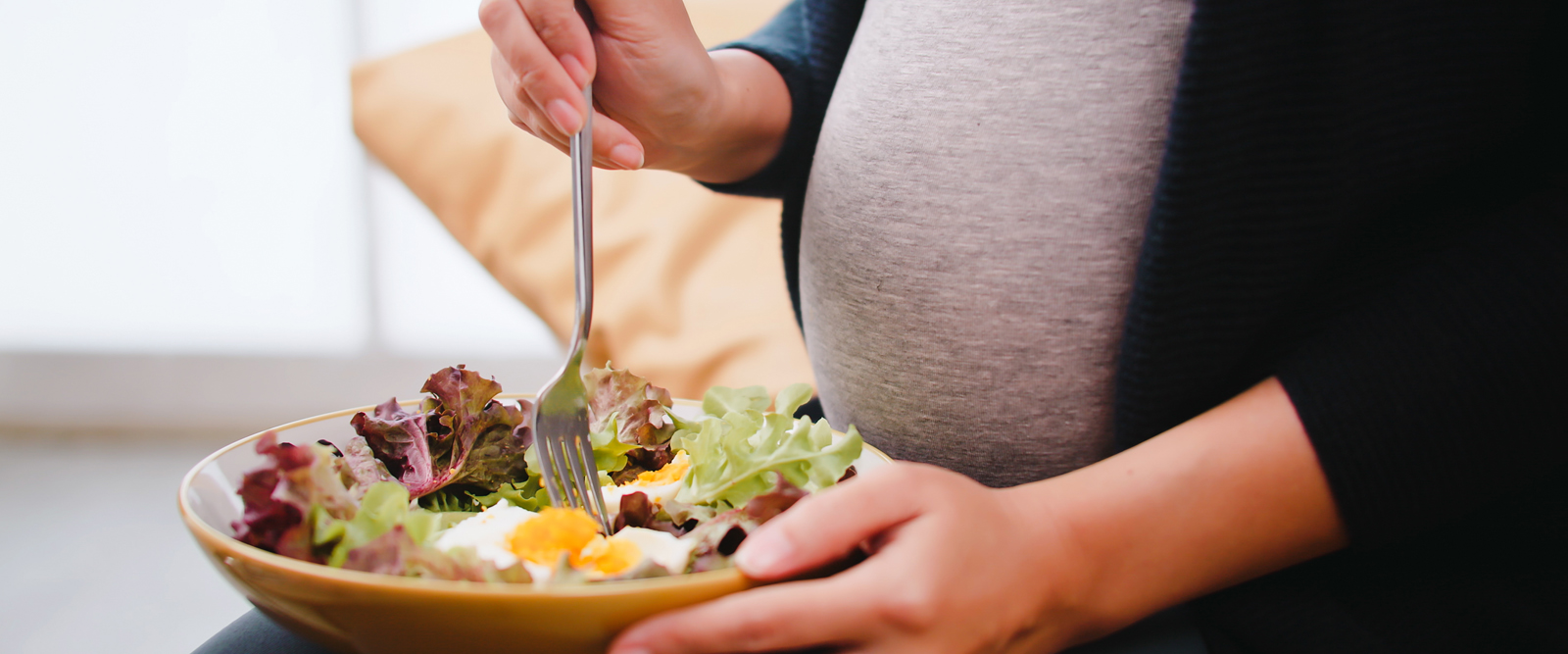An OB-GYN explains which foods are the healthiest for expecting mothers, and their babies, and what to avoid.

From sushi to cold cuts to blue cheese, it can be hard to keep track of what not to eat when pregnant. Is it safe to have coffee? What about hot dogs? Is all seafood totally off limits?
It’s normal to feel overwhelmed with information, but there are simple dietary guidelines that expecting mothers can follow to support a healthy pregnancy, says Dr. Donald Philibert Jr., Labor and Delivery Director at NewYork-Presbyterian Allen Hospital.

Dr. Donald Phillibert Jr.
“Expecting mothers change their diets and give up a lot to ensure the health of their growing babies,” he says. “But it doesn’t mean they have to give up everything they love to eat.”
Health Matters spoke with Dr. Philibert to learn more about what kinds of foods are off limits and what kinds of foods are essential during pregnancy.
What are some foods to avoid completely during pregnancy?
Dr. Philibert: When you’re pregnant, your immune system doesn’t work as efficiently as it usually does. Because of this immunocompromised state, there are certain foods that pregnant women should never have:
- Raw or undercooked seafood (such as sushi, ceviche, and cured fish like lox)
- Raw or undercooked meat (such as carpaccio and cured meats like salami and prosciutto)
- Deli meats or hot dogs (unless they are reheated until steaming hot or 165°F)
- High-mercury fish such as bigeye tuna (canned light tuna is safe), mackerel, orange roughy, swordfish, and shark
- Unpasteurized dairy products (such as soft cheeses like brie, feta, and blue cheese)
- Alcohol
Pregnant people should not eat any raw meats or unpasteurized dairy because they can contain parasites and harmful bacteria that can endanger both the mother and fetus. And when eating cheese, they should make sure it’s made with pasteurized milk (versus raw or unpasturized milk).
What are some foods to cut back on during pregnancy?
Many of my patients are very excited to learn that they don’t have to give up their morning cup of coffee. However, pregnant people shouldn’t have more than 200 mg of caffeine (or two eight-ounce cups of coffee) per day.
We also recommend trying to avoid foods with added sugars as much as possible. As the placenta grows, it produces certain hormones that increase the amount of sugar in your blood. Diabetes during pregnancy, or gestational diabetes, can be an indicator that the mother has an increased risk of developing diabetes. Hypertensive disorders of pregnancy, such as preeclampsia, can be an indicator of a higher risk for cardiovascular disease later in life.
In general, the stomach empties more slowly during the pregnancy, which can cause some stomach irritation, gastric reflux, and heartburn. In other words, your stomach will probably be a bit more sensitive while pregnant. Inflammatory foods, such as spicy foods or processed foods, can cause more discomfort than usual Additionally, hemorrhoids are more prevalent during pregnancy, and inflammatory foods can exacerbate this issue.
What kinds of nutrients should pregnant people prioritize in their diet?
It’s always important to eat a nutrient-rich diet, and especially so during pregnancy. The nutrients that pregnant people need the most are:
- Folic acid (found in liver, vegetables like spinach and asparagus, peas, and avocado)
- Calcium (found in dairy, tofu, edamame, almonds, and kale)
- Iron (found in red meat, poultry, shellfish, green leafy vegetables, lentils, and eggs)
It’s also crucial that they get enough protein in their diet. Meat, poultry, fish, dairy, and eggs are good sources of protein. If they are vegetarian, meat-free protein alternatives include quinoa, nuts, tofu, soy products, beans, and lentils.
Aim to “eat the rainbow,” or incorporate fruits and vegetables of lots of different colors into their diet. It ensures that you’re eating a plethora of different vitamins and minerals, and also that you’re getting enough fiber. Since the stomach empties more slowly during pregnancy, constipation may occur; a fiber-rich diet can help with this.
It’s also very important to stay hydrated throughout pregnancy. I advise my patients to keep a water bottle with them and continue to take sips throughout the day. It’s not uncommon for preterm contractions to occur due to dehydration, especially in hotter weather.
How much weight should someone gain during the course of pregnancy?
While it’s true you are “eating for two” during pregnancy, this doesn’t mean you should be doubling your normal food intake. Gaining too much weight during pregnancy can negatively affect the health of both the expecting mother and growing fetus.
During the first trimester, your caloric needs are about the same as they were pre-pregnancy. Some people may naturally lose some weight (up to five to ten percent of your body weight is considered normal) at the beginning of the pregnancy due to nausea and food sensitivities. This is very common and nothing to worry about.
In the second trimester, pregnant mothers should increase their intake by about 350 calories a day, and in the third trimester, they should increase by about 450 calories a day.
Of course, you don’t want all of this weight to come from “empty calories” – in other words, food that contains little or no nutritional value. Pregnant or not, it’s always better for your health to consume a diet full of whole foods (foods that aren’t processed, such as fruit, vegetables, beans, meat, fish, nuts).
In general, healthy nutrition paired with a safely active lifestyle during pregnancy will allow moms to feel their best during a time that is admittedly quite stressful on the body. I always encourage people to work with a nutritionist during pregnancy; they can work with you to create a personalized, realistic plan that will empower you to make the right dietary choices for you and your baby.
Share This Story
